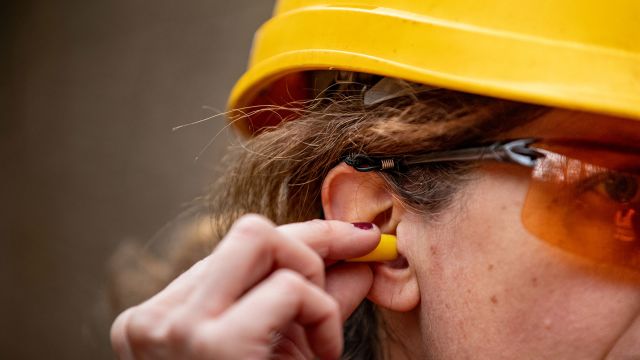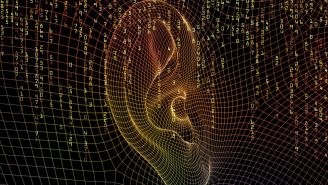Updated on June 13, 2024.
The world can be a noisy place. Every day we hear things like sirens and construction work. But these noises are so common, they may seem to fade into the background.
The problem is that loud sounds can have a serious effect on hearing. In fact, they are the second biggest cause of hearing loss.
When you lose your hearing because of noise, it’s called noise-induced hearing loss (NIHL). It affects millions of adults in the United States.
How does NIHL occur?
NIHL can come from the following.
- Long-term exposure to loud sounds, like a daily ride on a tractor or headphones worn at high volume for hours
- An “impulse” noise, or a very loud sound you only hear one time, like an explosion or a gunshot
The good news: NIHL can be prevented if you follow certain rules to protect your ears.
Why are loud noises a problem?
Hearing is complicated. It’s also fragile, which means it can be damaged easily. Here’s how that happens with NIHL.
- There are thousands of tiny hair cells inside your ears. These cells take sound waves and change them into electrical signals.
- Those signals go to your brain, where they are perceived as sound.
- A very loud noise harms or destroys those cells. Once they are gone, they don’t come back.
Sometimes, the part of the brain that moves electrical signals can also be harmed.
What factors contribute to NIHL?
Some things raise your risk of NIHL. Here are three factors to keep in mind.
1. How loud is the sound? Noise levels are measured in decibels (dBA). The higher the decibel level, the less time you can safely listen to a sound at that volume.
Here are the decibel levels of some everyday sounds.
- Conversation with friends or a dish washing machine: These noises are around 60 dBA. They are safe for your hearing for any amount of time.
- Subways or passing motorcycles: These noises are around 91 dBA. They are a risk to your hearing. Experts recommend wearing something to protect your ears.
- Headphones at top volume or a snow blower: These noises range from 94 to 112 dBA. They are extremely loud and dangerous to your hearing.
- Sirens or a plane taking off: These noises range from 120 to 130 dBA. They are unsafe to hear for any amount of time.
- Firearms or firecrackers: These are “impulse” noises. They are measured in decibel peak pressure (dBP). They range from 140 to 150 dBP. Hearing them can cause instant damage to your ears. This damage can’t be fixed.
2. How close are you? This will affect how harmful a loud noise is to your hearing. A siren that’s a mile away is not as bad as one that’s outside your window.
3. How long does it last? The louder the noise, the less time you can listen to it safely. For example:
- At 85 dBA, you can listen for eight hours.
- At 91 dBA, you can listen for two hours.
- A single second of an impulse noise can lead to permanent hearing loss.
To protect your ears, remember that less noise means better hearing.
Know the signs of NIHL
The two most common symptoms of NIHL are:
- Not being able to hear
- Tinnitus, or a ringing or buzzing in the ears
Other signs include:
- Always asking people to repeat themselves
- Problems hearing when there are other noises
- Needing to increase the volume on your TV or headphones
- Sounds being distorted or seeming muffled
NIHL can be prevented
Avoiding all loud noises is hard to do. But you should try as much as possible.
If you work in a loud place like an airport, your employer has to follow certain rules. You must be given hearing protection if noise goes over a certain level for a long time.
You can also try these ideas to protect your hearing.
- Measure it. Download an app to check the level of noise around you. One option is called the NIOSH Sound Level Meter App.
- Get educated. Learn what types and levels of noise can cause damage to your hearing.
- Avoid loud noise when possible. If you can't avoid it completely, take breaks. At loud events, sit far away from the source of the noise.
- Use protection. Try earplugs that fit into your ear. Or use earmuffs that fit snugly and cover your ears completely. For the loudest noises, use earplugs and earmuffs together.
- Turn it down. Don’t increase the volume on your TV, headphones, or other devices if you don’t have to.
- Be smart with headphones. Limit your time using them. Try to use over-the-ear headphones instead of earbuds, which can be louder.
Are you often exposed to loud noise? It's wise to get your hearing checked regularly. This is very important if you suspect hearing loss. If it’s found early, you can take steps to avoid more damage.
Talk to a trained audio professional. An audiologist or otolaryngologist can also decide if you need to wear hearing aids.







